“Under the Law” Part 1-4
The Signs of the Times 12, 17. May 6, 1886
E. J. Waggoner
One of the peculiarities of the human mind is that while it readily grasps a pleasing story or a fable, it refuses to accept truth until it is compelled to.
 So strong is this tendency toward error, that mental philosophers are obliged to take it into account. One of Bacon’s rules for avoiding erroneous conclusions is the following: “In general, let the student of nature take this as a rule, that whatever the mind seizes and dwells upon with particular satisfaction is to be held in suspicion.”
So strong is this tendency toward error, that mental philosophers are obliged to take it into account. One of Bacon’s rules for avoiding erroneous conclusions is the following: “In general, let the student of nature take this as a rule, that whatever the mind seizes and dwells upon with particular satisfaction is to be held in suspicion.”
The converse would teach that truth will naturally be repelled and rejected.
And this is just what the Bible says: “The natural man receiveth not the things of the Spirit of God.” 1 Cor. 2:14. “The carnal mind is enmity against God; for it is not subject to the law of God, neither indeed can be.” Rom. 8:7. “For out of the heart proceed naturally evil thoughts, murders, adulteries, fornications, thefts, false witness, blasphemies.” Matt. 15:19.
These things are directly opposed to the law of God; and therefore, as a general thing, before men will accept the truth of the Bible concerning the law, every feature must be made perfectly clear. It is not enough that the principles be unfolded, but the harmony of all the texts bearing on the subject must be shown.
Accordingly, we find it necessary to devote special explanation to Rom. 6:14 and kindred texts.
That text reads thus:
“For sin shall not have dominion over you; for ye are not under the law, but under grace.”
 So strong is the natural tendency to reject truth, that in spite of the overwhelming evidence already produced to show that the law is to all eternity binding upon every created rational being, many people will seize upon the expression, “Ye are not under the law,” and claim that there are some, at least, who have no duty to keep it.
So strong is the natural tendency to reject truth, that in spite of the overwhelming evidence already produced to show that the law is to all eternity binding upon every created rational being, many people will seize upon the expression, “Ye are not under the law,” and claim that there are some, at least, who have no duty to keep it.
The readiness with which this view is seized and dwelt upon, should alone arouse suspicion as to its justice. But that there may be no chance for an honest doubt, we propose to examine not only this text, but every text which contains the phrase, “under the law.”
In Rom. 6:12 the apostle gives this exhortation:
“Let not sin therefore reign in your mortal body, that ye should obey it in the lusts thereof.” We have already learned that “sin is the transgression of the law.” 1 John 3:4. Therefore when the apostle tells us not to sin, he virtually tells us not to transgress the law.
But this is an evidence that the law is binding upon us; and therefore we are assured that the statement in verse 14 cannot mean that the law has no claims upon us. Again: The apostle continues: “Neither yield ye your members as instruments of unrighteousness unto sin; but yield yourselves unto God, as those that are alive from the dead, and your members as instruments of righteousness unto God.” Rom. 6:13.
This is but a repetition of the argument presented in the preceding paragraph. For he says we must not sin, that is, must not transgress the law; and again, that we must yield our members as instruments of righteousness. Now righteousness is obedience to the commandments of God. See Deut. 6:25; Ps. 119:172; Isa. 51:6-7, which have already been explained. So the 13th verse is an exhortation not to transgress the law, and another exhortation to keep the law, both of which amount to the same thing, and show that the apostle recognizes the fact that the law is in existence and is to be obeyed.
Then comes the conclusion:
“For sin shall not have dominion over you; for ye are not under the law, but under grace.” Verse 14.
Notice a few facts and necessary conclusions.
- Since “sin is the transgression of the law,” the absence of sin must indicate obedience to the law. Therefore when the apostle says to any persons, “Sin shall not have dominion over you,” it is an evidence that they are keeping the law.
-
Those over whom sin has no dominion are those who are not under the law. “Sin shall not have dominion over you; for ye are not under the law.” The fact that sin has no dominion over them is an evidence that they are “not under the law.” Therefore, to be “not under the law” is equivalent to being free from the dominion of sin.
-
But we have already seen that to be free from the dominion of sin represents a state of obedience to the law; therefore, to say that one is “not under the law” is equivalent to saying that he is keeping the law. These propositions will stand the test of any criticism, and they demonstrate that the apostle’s argument is based on the fact that the law is in full force, binding upon all, and that there are but two classes of people; those who keep the law, and those who transgress it. Those who keep the law are not under it, and of course, those who transgress it are under it.
In other words, those over whom sin has dominion are under the law; and those over whom sin has not dominion, are not under the law.
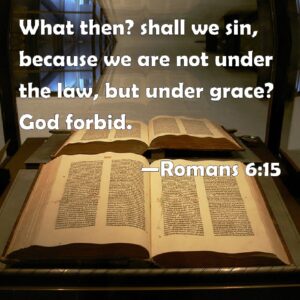 In harmony with this, the apostle continued “What then? Shall we sin, because we are not under the law, but under grace? God forbid.” Verse 15. That is, Shall we transgress the law because we are not under it? By no means.
In harmony with this, the apostle continued “What then? Shall we sin, because we are not under the law, but under grace? God forbid.” Verse 15. That is, Shall we transgress the law because we are not under it? By no means.
Keep from under it, by refraining from sin. Thus far we have not shown the full force of the terms “under the law,” and “not under the law,” but have simply shown that they do not indicate that any persons are outside the jurisdiction of the law; that those “under the law” are violating it, while those “not under the law” are obeying it.
The next two verses give us a clue to the real force of the terms. They read thus:
“Know ye not, that to whom ye yield yourselves servants to obey, his servants ye are to whom ye obey; whether of sin unto death, or of obedience unto righteousness? But God be thanked, that ye were the servants of sin, but ye have obeyed from the heart that form of doctrine which was delivered you.” Verses 16, 17.
“Whether of sin unto death, or of obedience unto righteousness.” Sin, the transgression of the law, brings death. “For the wages of sin is death.” Rom. 6:23.
Every one who sins is under condemnation of death; and since, as has been abundantly proved, those who sin are “under the law,” it follows that “under the law” is an expression meaning, under the condemnation of the law.
Now see how aptly this meaning fits verses 14 and 15. Ye are not under the condemnation of the law, but under the grace of God. Shall we sin, then, because we are not by the law condemned to death? No, indeed; for that would at once bring us again under condemnation.
Let us keep from sinning, and then we shall be no more condemned.
How are we freed from the condemnation which the law brings?
“Being justified freely by his [God’s] grace through the redemption that is in Christ Jesus; whom God hath set forth to be a propitiation through faith in his blood, to declare his righteousness for the remission of sins that are past.” Rom. 3:24, 25.
Having accepted Christ, His righteousness is imputed to us, which makes us clear before the law, and we are then subjects of the grace, or forbearance of God. Take an illustration from human affairs. Here is a man that has been convicted of murder. The law of the State forbids murder, and therefore it condemns the man. The murderer is then “under the law,” because the hand of the law is upon him. Nothing that he can do will avert the threatened punishment. He may be sorry for his crime, and may resolve never to break the law again; but that will make no difference. He has already broken the law, and must suffer the penalty. But now, through the intercession of powerful friends, and because of his repentance and his promises of future obedience, the Governor is induced to pardon the criminal. Now he is no longer under the law,-a condemned prisoner,-but a free man. He is free by virtue of the grace or favor of the Governor. Therefore he may be said to be “under grace.”
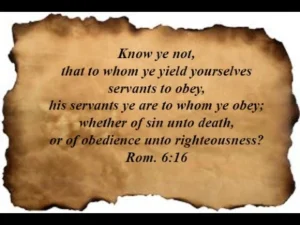 The question now arises. Is he at liberty to commit murder, because he is not under the law, but under the grace of the Governor? Everybody says, No, indeed. He is now under even greater obligation to keep the law than he was before, because he is the subject of the Governor’s special favor; and that favor would not have been extended to him, but for his promise to henceforth keep the law. And as sin brought condemnation and death, so, when we are cleared from sin and condemnation, continued obedience, or righteousness, brings eternal life through Christ. This is indicated by the expression, servants “of obedience unto righteousness” (Rom. 6:16) and, “the gift of God is eternal life through Jesus Christ our Lord.” Rom. 6:23. In closing this preliminary study of the term, “under the law,” the reader can profitably compare what he has read, with the following verses:-
The question now arises. Is he at liberty to commit murder, because he is not under the law, but under the grace of the Governor? Everybody says, No, indeed. He is now under even greater obligation to keep the law than he was before, because he is the subject of the Governor’s special favor; and that favor would not have been extended to him, but for his promise to henceforth keep the law. And as sin brought condemnation and death, so, when we are cleared from sin and condemnation, continued obedience, or righteousness, brings eternal life through Christ. This is indicated by the expression, servants “of obedience unto righteousness” (Rom. 6:16) and, “the gift of God is eternal life through Jesus Christ our Lord.” Rom. 6:23. In closing this preliminary study of the term, “under the law,” the reader can profitably compare what he has read, with the following verses:-
“Therefore as by the offence of one judgment came upon all men to condemnation; even so by the righteousness of one the free gift came upon all men unto justification of life. For as by one man’s disobedience many were made sinners, so by the obedience of one shall many be made righteous. Moreover the law entered, that the offence might abound. But where sin abounded, grace did much more abound; that as sin hath reigned unto death, even so might grace reign through righteousness unto eternal life by Jesus Christ our Lord.” Rom. 5:18-21.
E. J. W.
“Under the Law” Part 2-4
The Signs of the Times 12, 18.
E. J. Waggoner
The next text which we shall notice is Gal. 5:18.
“But if ye led of the Spirit, ye are not under the law.”
Antinomians very rarely quote this verse, doubtless because it is so very evident from the connection that the law is recognized as being in active existence. Let us give it our attention for a little while, that we may see what beautiful harmony there is in the Bible on the subject of the law.
Since those who are led by the Spirit are not under the law, it follows that those who are not led by the Spirit are under the law. Again, the preceding verses read as follows:
 “This I say then, Walk in the Spirit, and ye shall not fulfill the lust of the flesh. For the flesh lusteth against the Spirit, and the Spirit against the flesh; and these are contrary the one to the other.” Gal. 5:16, 17.
“This I say then, Walk in the Spirit, and ye shall not fulfill the lust of the flesh. For the flesh lusteth against the Spirit, and the Spirit against the flesh; and these are contrary the one to the other.” Gal. 5:16, 17.
These verses state in the plainest terms that the flesh and the Spirit are contrary to each other; that walking in the flesh and walking in the Spirit are directly opposite conditions. Then since those who are led by the Spirit are not under the law, and those who are not led by the Spirit are under the law, it follows that those who are under the law are those who are fulfilling the lusts of the flesh.
“Now the works of the flesh are manifest, which are these: Adultery, fornication, uncleanness, lasciviousness, idolatry, witchcraft, hatred, variance, emulations, wrath, strife, seditions, heresies, envyings, murders, drunkenness, revelings, and such like; of the which I tell you before, as I have also told you in time past, that they which do such things shall not inherit the kingdom of God.” Gal. 5:19-21.
The fruit of the Spirit is, of course, the very opposite, being “love, joy, peace, longsuffering, gentleness, goodness, faith, meekness, temperance.” Verses 22, 23. Referring to these fruits of the Spirit, the apostle says: “Against such there is no law.” Verse 23. That is, those who are led by the Spirit, and who yield its fruits, are in harmony with the law; while the law is against the works of the flesh; and those who do the works of the flesh are condemned by the law, or are under it. Here we arrive at the same conclusion as in regard to Rom. 6:14, that “under the law” simply represents a state of antagonism to, and violation of, the law; and of course no one could be in such a state if the law were not in full force.
Now since all sinners are by the law condemned to death (Rom. 3:19; 6:23), it follows again that “under the law” means condemned by the law-under the sentence of death. Turning backward, we find the expression “under the law” used twice in Gal. 4:4-5:
“But when the fullness of the time was come, God sent forth his Son, made of a woman, made under the law, to redeem them that were under the law, that we might receive the adoption of sons.”
In the third verse the apostle says that when we were children we were “in bondage under the elements of the world.” But (that marks a change) God sent forth His Son to redeem “them that were under the law.”
We would naturally expect the redemption to be from that under which we were in bondage, which was “the elements of the world.” In the fifth verse the redemption is said to be from “under the law,” thus showing that “in bondage under the elements of the world,” and “under the law,” are equivalent terms.
Let us trace further this matter of bondage.
In verse 9 Paul says to the Galatians:
“But now, after that ye have known God, or rather are known of God, how turn ye again to the weak and beggarly elements, whereunto ye desire again to be in bondage?”
Here it is implied that they were in danger of returning to a condition in which they had previously been. And what condition was that? Read verse 8:
“Howbeit then, when ye knew not God, ye did service unto them which by nature are no gods.”
That is, they were heathen. So being in bondage to the elements of the world,- the “weak and beggarly elements,”-is equivalent to being in a state of heathenism. Those who do not know God are termed heathen. But no man can know God without being a follower of Christ, as the Saviour said, “No man cometh unto the Father, but by me.” John 14:6.
In the strict Bible sense, therefore, all who are not in Christ are heathen. And therefore, although Paul addressed his epistle to those who had been idolaters in the commonly accepted sense, the argument is of universal application. We conclude, then, that the “elements of the world” are simply the various forms of sin.
This is still further shown by Eph. 2:1-3:
“And you hath he quickened, who were dead in trespasses and sins; wherein in time past ye walked according to the course of this world, according to the prince of the power of the air, the spirit that now worketh in the children of disobedience; among whom also we all had our conversation [manner of life] in times past in the lusts of our flesh, fulfilling the desires of the flesh and of the mind; and were by nature the children of wrath, even as others.”
 Nothing but sin is meant by “the course of this world,” the “weak and beggarly elements,” and “the elements of the world.” And to be “in bondage under the elements of the world,” is to be “under the law,” in a state of condemnation.
Nothing but sin is meant by “the course of this world,” the “weak and beggarly elements,” and “the elements of the world.” And to be “in bondage under the elements of the world,” is to be “under the law,” in a state of condemnation.
Christ came in the fullness of time (see Mark 1:14-15; Dan. 9:25) “to redeem them that were under the law.” But in order to do this, He Himself had to be “made under the law.”
This is in harmony with Heb. 2:17, which says:
“Wherefore in all things it behooved him to be made like unto his brethren, that he might be a merciful and faithful high priest in things pertaining to God, to make reconciliation for the sins of the people.”
The people whom Christ came to redeem were “under the law,” therefore he was made like them, “under the law.”
Now if there is any lingering doubt as to the meaning of “under the law,” compare with the above and Gal. 4:4-5, Paul’s words in 2 Cor. 5:21:
“For he [God] hath made him [Christ] to be sin for us, who knew no sin; that we might be made the righteousness of God in him.”
Christ was sinless; He “did no sin, neither was guile found in his mouth” (1 Peter 2:22); the Law of God was in His heart (Ps. 40:8), and His whole life was an exemplification of the law. Yet knowing no sin, He was made to be sin for us. As the prophet said:
“He was wounded for our transgressions, he was bruised for our iniquities; the chastisement of our peace was upon him; and with his stripes we are healed. All we like sheep have gone astray; we have turned every one to his own way; and the Lord hath laid on him the iniquity of us all.” Isa. 53:5, 6.
We were in bondage to sin, “under the law,” and He took upon Himself the same bonds, and was made under the law. Moreover, since those “under the law” are condemned, under sentence of death, He, “being found in fashion as a man,” having voluntarily placed Himself in the same condemnation, “became obedient unto death, even the death of the cross.” Phil. 2:7-8.
And so the innocent suffered for the guilty.
Man had been overcome by sin, and by it brought into bondage (2 Peter 2:19), and in order to redeem him from this corruption, and the death that must necessarily follow (James 1:15), the spotless Son of God took upon Himself the form of a servant of sin, and consented to be covered with the same degradation into which man had plunged himself.
What for? “That we might be made the righteousness of God in him.” 2 Cor. 5:21. In order that we might be made without “spot, or wrinkle, or any such thing” (Eph. 5:27),-perfectly conformable to the holy Law of God; and that thus being enabled, in Christ, to keep the commandments, we might through Him have eternal life. Matt. 19:17.
Before leaving this text in Galatians, there is one more point which we wish to place before the reader.
We read that Christ was “made under the law, to redeem them that were under the law.” It was necessary for Christ to assume the condition of those whom He would redeem. This being the case, we may know that Christ redeems none who occupy a position different from that which He took. This is plainly stated in the Scripture. “For verily he took not on him the nature of angels; but he took on him the seed of Abraham. Wherefore in all things it behooved him to be made like unto his brethren,” etc. Heb. 2:16-17.
Those whom He was made like, He can redeem; others He cannot.
We read also that Christ “died for all.” 2 Cor. 5:15. What, then, is the necessary conclusion? Just this: Since He was made “under the law,” and was made like those whom He came to redeem, and He came to redeem all men, then all men were “under the law.”
Further, the text indicates that He came for the sole purpose of redeeming them that were under the law; their being under the law made necessary some act for their redemption. If they had not been under the law, they would have needed no redemption. Now when we recall Paul’s words to the effect that Christ “gave himself for us, that he might redeem us from all iniquity, and purify unto himself a peculiar people, zealous of good works” (Titus 2:14), the conclusion is unavoidable that “under the law” indicates the state of sin which characterizes every human being, and from which none can be rescued but by Christ.
But notice the dilemma in which they place themselves, who claim that Gentiles are not “under the law,” and that the law was only for the Jews. If that position were true, it would necessarily follow that since Christ came to redeem only those who are under the law, He came to redeem only the Jews! For certain it is, that no person who is not in the position which Christ took upon Himself when He came to redeem man, can have any part in that redemption.
We think that none, when they consider this point, will place themselves outside of God’s scheme of redemption, by refusing to admit that they are by nature and by practice “under the law.” Let us rather acknowledge our guilt, that it may be washed away in the blood of the Lamb. “He that covereth his sins shall not prosper; but whoso confesseth and forsaketh them shall have mercy.” Prov. 28:13. W.
“Under the Law” Part 3-4
The Signs of the Times 12, 20. May 27, 1886,
E. J. Waggoner
The text which next claims our consideration is Gal. 4:21:
“Tell me, ye that desire to be under the law, do ye not hear the law?”
A complete understanding of the force of this verse can be had only by (1) a knowledge of the peculiar danger of the Galatians, which made the writing of this epistle necessary; (2) an examination of the remainder of the chapter, which involves (3) a brief consideration of the two covenants.
As this is all in the line of our study of the law, and will be very useful in our further investigation, we will take time right here to examine these points.
In the first chapter of Galatians, Paul speaks of his call to the ministry, and his first connection with the church. His call, he says, was not from men, but from God. It was three years after his conversion before he went to Jerusalem, and then the only apostles whom he saw were Peter and James. Therefore he did not receive his knowledge of the gospel from men, but by the revelation of Jesus Christ. In the second chapter, Paul states the occasion of his second visit to Jerusalem, which was fourteen years after his first visit. The occasion of this visit was the council which was held in Jerusalem, and which forms the subject of the fifteenth chapter of Acts. Certain men had come down from Judea to Antioch, where Paul was laboring, and had taught the brethren, saying, “Except ye be circumcised after the manner of Moses, ye cannot be saved.” Acts 15:1.
After much discussion in regard to the matter, the brethren determined that Paul and Barnabas, and a few others, should go up to Jerusalem to lay the matter before the apostles and elders. That the question which came before this council was the one which was troubling the Galatian brethren, in regard to which they were in danger, appears from the second chapter of Galatians.
 Paul mentions the visit, but assures the brethren that those who “seemed to be somewhat in conference,” that is, the leading men in the council, “added nothing” to him. The gospel had been made known to him by direct revelation from Jesus Christ, and so he knew the whole truth of the matter before the council convened.
Paul mentions the visit, but assures the brethren that those who “seemed to be somewhat in conference,” that is, the leading men in the council, “added nothing” to him. The gospel had been made known to him by direct revelation from Jesus Christ, and so he knew the whole truth of the matter before the council convened.
Further, he states that after the council, he had a controversy on the very same subject which was there discussed, with Peter, who was acting contrary to the decision of the council. These things show that the danger which threatened the Galatian brethren, and which called out Paul’s epistle to them, was the same thing into which the men from Judea tried to lead all of Paul’s converts. For the Jews constantly followed Paul around, trying to overthrow his work.
Let us now examine the teaching of these men from Judea. “Except ye be circumcised after the manner of Moses, ye cannot be saved.” Of course all the kindred ordinances of the ceremonial law were included with circumcision.
Now why did they want to force circumcision upon these converts from among the Gentiles? The reason given was, in order that they might be saved. Circumcision, they taught, was the one thing indispensable, if they would secure salvation. But the only thing which stands in the way of salvation of all men is sin; and therefore since circumcision was put forth as the condition of salvation, we must conclude that it was urged as a means of justification.
But this was directly contrary to the gospel which Paul preached, namely, that justification comes only through Christ. This was indeed “another gospel,” which was no gospel at all. That the seditious ones urged circumcision upon the Gentiles as the means of justification, is still further shown by the words of Peter, who said:
“Men and brethren, ye know how that a good while ago, God made choice among us, that the Gentiles by my mouth should hear the word of the gospel, and believe. And God, which knoweth the hearts, bare them witness, giving them the Holy Ghost, even as he did unto us; and put no difference between us and them, purifying their hearts by faith.” Acts 15:7-9.
Peter’s argument was that God purposed to treat the Gentiles who believed just as he did the believing Jews, giving both the Holy Ghost, and purifying them by faith, and not by circumcision or by any other work which they could do.
Notice particularly the effect which the teaching of these men from Judea must necessarily have had on those who accepted it. It led those who accepted it to reject Christ as the means of justification from sin.
If they were justified by circumcision, of course they would have no need of Christ. And this was why that doctrine was taught.
These men from Judea did not accept Christ; their sole opposition to the preaching of Paul and the other apostles was that Christ was set forth as the only means of justification and future resurrection. See Acts 4:1-2.
“And as they spake unto the people, the priests, and the captain of the temple, and the Sadducees, came upon them, Being grieved that they taught the people, and preached through Jesus the resurrection from the dead.” Acts 4:1-2.
These men from Judea are sometimes styled “Judaizing Christians,” but they were not Christians at all. Their sole work was to oppose the gospel of Christ. And in their hatred of it and of Christ, they went about among the churches, trying to induce the new converts to seek pardon and salvation by circumcision, instead of through Christ.
These were the men who were “zealously affecting” the Galatians, with the sole purpose of “excluding” them from the faith of Christ.” Gal. 4:17.
 We have before shown that all who are in sin are “under the law,”– condemned. Then since besides Christ “there is none other name under Heaven given among men, whereby we must be saved” (Acts 4:12),-since men are not justified by any works of their own, but solely by faith in Christ,-it follows that all who accepted the teaching of the men from Judea, and were circumcised for justification, were still “under the law.”
We have before shown that all who are in sin are “under the law,”– condemned. Then since besides Christ “there is none other name under Heaven given among men, whereby we must be saved” (Acts 4:12),-since men are not justified by any works of their own, but solely by faith in Christ,-it follows that all who accepted the teaching of the men from Judea, and were circumcised for justification, were still “under the law.”
No amount of work, whether it was circumcision or something else, could clear them from the guilt of past sins.
Moreover, those who had accepted Christ, and had been forgiven, if they listened to this teaching fell from grace; for to be circumcised with a view to justification thereby, was simply rejecting Christ and repudiating their former profession. And this is just what Paul told them: “Behold, I Paul say unto you, that if ye be circumcised, Christ shall profit you nothing.” Gal. 5:2.
Paul did not mean that there was anything wicked in circumcision of itself, for he himself circumcised Timothy, and that, too, after the council at Jerusalem. Acts 16:1-3. Timothy’s father was a Gentile, although his mother was a Jewess, and if Timothy had not been circumcised, he would not have been allowed to labor with Paul among the Jews in their synagogues. Therefore as a matter of expediency, Paul circumcised Timothy, thus showing that whether a man was circumcised or not, was regarded by him as a matter of no vital importance. See 1 Cor. 7:19.
But when men submitted to circumcision as a means of gaining salvation, that moment they rejected Christ, man’s only hope, and therefore Christ profited them nothing, Christ cannot help those who reject Him. So we see that it was a grave heresy which was being preached to these young Christians. Note again: The heathen religion was a religion of forms and ceremonies. Some of these ceremonies were of the most licentious nature. Now if the converts from among the heathen could only be induced to rest their hope of salvation on Jewish ceremonies, it would be but a step for them to sink back into their old heathen customs. This was actually the effect that it had on the Galatians; for Paul said to them:
“Ye observe days, and months, and times [Deut. 18:8-10 tells how the Lord regarded this], and years. I am afraid of you, lest I have bestowed upon you labor in vain.” Gal. 4:10-11.
Their being circumcised did not lead simply to the substitution of Judaism for Christianity, but to a relapse into heathenism. And thus we see that the Galatians were really going back “under the law,” or, as stated in verse 9, they were turning to the weak and beggarly elements of the world, to which they were desirous of again being in bondage.
Some may wonder at the expression which Paul uses in verse 21, “Tell me, ye that desire to be under the law,” etc. Why should Paul charge them with desiring death? For if “under the law” means under sentence of death, he did virtually charge them with desiring death.
A parallel passage is found in Prov. 8:36: “They that hate me love death.” Now while no one would love death itself, so as to deliberately choose it, people do love sin, not realizing that the end thereof is death. So with those to whom Paul speaks. They desired a certain thing which would bring them under the condemnation of the law; and therefore they could be said to desire to be under the law, although they did not realize that such would be the consequences of their choice. W.
“Under the Law.” Part 4-4
The Signs of the Times 12, 21. June 3, 1886
E. J. Waggoner. (Concluded.)
We have now learned the danger which threatened the Galatian brethren, and can understand Paul’s fear for them, and his statement that they desired to be “under the law,”-in bondage to the elements of the world.
It will therefore be a short task to examine the remaining portion of this fourth chapter of Galatians, and note what bearing it has on the law. The apostle continues:-
 “Tell me, ye that desire to be under the law, do ye not hear the law? For it is written, that Abraham had two sons, the one by a bondmaid, the other by a free woman. But he who was of the bondwoman was born after the flesh; but he of the freewoman was by promise. Which things are an allegory; for these are the two covenants; the one from the Mount Sinai, which gendereth to bondage, which is Agar. For this Agar is Mount Sinai in Arabia, and answereth to Jerusalem which now is, and is in bondage with her children. But Jerusalem which is above is free, which is the mother of us all.” Gal. 4:21-26.
“Tell me, ye that desire to be under the law, do ye not hear the law? For it is written, that Abraham had two sons, the one by a bondmaid, the other by a free woman. But he who was of the bondwoman was born after the flesh; but he of the freewoman was by promise. Which things are an allegory; for these are the two covenants; the one from the Mount Sinai, which gendereth to bondage, which is Agar. For this Agar is Mount Sinai in Arabia, and answereth to Jerusalem which now is, and is in bondage with her children. But Jerusalem which is above is free, which is the mother of us all.” Gal. 4:21-26.
It will be seen at once that in these verses three things are placed in contrast with three other things: Hagar, ancient Jerusalem, and the old covenant are placed in opposition to Sarah, the new Jerusalem, and the new covenant.
Ishmael and Isaac stand respectively as representatives of those under the old covenant, and those under the new.
It will also be noticed that those who are free are the children of the New Jerusalem, the new covenant, while those in bondage, “under the law,” are children of the old Jerusalem, the old covenant. The explanation of this chapter, then, involves an explanation of the two covenants.
This we can do only in the briefest manner. The first covenant was made with the children of Israel when they left Egypt. See Heb. 8:8-9. The terms of that covenant are found in Ex. 19:3-8; 24:3-8. They were simply as follows: God promised to make of the Israelites a great nation, a kingdom of priests, if they, in turn, would obey His law. This they promised to do. Thus the covenant, or agreement, was made. The law of God was the basis of the covenant, or that concerning which the covenant was made. See Ex. 24:8.
Now notice what this covenant required of the people. The Lord had first promised to do certain things for them if they would obey His voice. Then they heard His voice speaking the law in thunder tones from Sinai, and after that they renewed their promise of obedience, saying, “All that the Lord hath said will we do, and be obedient.” Ex. 24:7.
This was nothing less than an agreement to yield perfect obedience to the law. Those who “hear the law,” know that it covers every act or thought of man’s entire life.
Therefore, if the Jews had fulfilled their promise, they would have merited all the blessings which God promised them; but, unfortunately, they did not, neither could they. They had already broken the law many times, and were sinful by nature, so that it was utterly impossible for them, in their own strength, to yield perfect obedience to it. See Rom. 8:7-8; Gal. 5:17.
Now in this covenant there was no provision for the forgiveness of sins either past or future,-no hint of Christ, through whom alone forgiveness and power to keep the law can come. They had virtually made a promise to make themselves righteous before God. But every one who attempts to do this must fail, and therefore it is truly said that that covenant gendered to bondage. Let no one imagine that we mean that that covenant made them under obligation to keep the law.
The obligation to keep the law existed before any covenant was made; but we mean that that covenant left them just where it found them,-in condemnation because of violated law.
Had there never been any other covenant than this, the whole world must have been lost. (Rom. 3:19.) Some will ask if God did not know that they could not of themselves keep the law perfectly, and if it was not trifling with them to make such a covenant with them.
God did indeed know that they had no power to do as they agreed, but in making the covenant He was not trifling with them. The making of such an agreement was the most forcible way that could be devised to bring home to their minds a sense of their condition. In their vain endeavors to keep the whole law in their own strength, they would learn their need, and that would turn their attention to that other covenant, called the new covenant, but which in reality had been in existence ever since the fall. Here it is:-
 “Behold, the days come, saith the Lord, that I will make a new covenant with the house of Israel, and with the house of Judah; not according to the covenant that I made with their fathers, in the day that I took them by the hand to bring them out of the land of Egypt; which my covenant they brake, although I was an husband unto them, saith the Lord. But this shall be the covenant that I will make with the house of Israel; after these days, saith the Lord, I will put my law in their inward parts, and write it in their hearts; and will be their God, and they shall be my people. And they shall teach no more every man his neighbor, and every man his brother, saying, Know the Lord; for they shall all know me, from the least of them unto the greatest of them, saith the Lord; for I will forgive their iniquity, and I will remember their sin no more.” Jer. 31:31-34.
“Behold, the days come, saith the Lord, that I will make a new covenant with the house of Israel, and with the house of Judah; not according to the covenant that I made with their fathers, in the day that I took them by the hand to bring them out of the land of Egypt; which my covenant they brake, although I was an husband unto them, saith the Lord. But this shall be the covenant that I will make with the house of Israel; after these days, saith the Lord, I will put my law in their inward parts, and write it in their hearts; and will be their God, and they shall be my people. And they shall teach no more every man his neighbor, and every man his brother, saying, Know the Lord; for they shall all know me, from the least of them unto the greatest of them, saith the Lord; for I will forgive their iniquity, and I will remember their sin no more.” Jer. 31:31-34.
In what respect does this covenant differ from the other?
Is it in regard to the keeping of the law? No; for that is required in both. But in this there is forgiveness of sins, and the blotting out of transgressions. More than this, the law is to be written in the hearts of the people, and that means that they will be enabled to keep it perfectly. See Ps. 40:8.
This work is done by Christ. Through Him, pardon is secured, and He enables us to be made the righteousness of God. It will readily be seen that, whereas the other covenant found and left the people in bondage to sin, and under condemnation of death, this covenant enabled them to become free from sin and condemnation.
“There is therefore now no condemnation to them which are in Christ Jesus, who walk not after the flesh, but after the Spirit.” Rom. 8:1.
Now the application of Paul’s words is easy. Hagar was a bondwoman, and Ishmael, her son, was begotten according to the flesh. Sarah was a freewoman, and her son, Isaac, was a child of promise, born not according to the flesh, but when humanly speaking, such a thing as the birth of a child was impossible. Since Ishmael “was born after the flesh,” he is a fit type of those who are “in the flesh;” and in this condition are all careless sinners, as well as all who attempt to secure salvation by their own unaided efforts.
When men have once sinned, it is contrary to anything in nature that they should ever be made to appear perfectly righteous,-as though they had never sinned. But God, by a miracle of grace, which is manifested through Jesus Christ, causes this to be done, so that the sinner may stand before the law uncondemned. And so those who have obtained this freedom may be fitly represented by Isaac, who was born contrary to the order of nature, solely because of the promise of God.
So likewise, the old Jerusalem, which was rejected of God because it had killed the prophets, and stoned them which were sent to it, and had rejected Christ, is very aptly termed the mother of those who are in bondage because of sin. The New Jerusalem, however, is called the Bride, the Lamb’s wife (See Rev. 21:2, 9-10, and onward); and since Christ is the Everlasting Father (Isa. 9:6), and it is He alone that gives freedom (Rom. 8:1; John 8:33-36), the city is very properly called the mother of all those who are saved from sin.
“But as then he that was born after the flesh persecuted him that was born after the Spirit, even so it is now.” Gal. 4:20.
This is only another form of what we find in Gal. 5:17:
“For the flesh lusteth against the Spirit, and the Spirit against the flesh; and these are contrary the one to the other; so that ye cannot do the things that ye would.”
“Nevertheless what saith the Scripture? Cast out the bondwoman and her son; for the son of the bondwoman shall not be heir with the son of the freewoman.” Gal. 4:30.
Exactly; the works of the flesh must be put away, for “they which do such things shall not inherit the kingdom of God.” “They that are Christ’s have crucified the flesh with the affections and lusts.” Gal. 5:24.
The apostle, having shown the bondage in which all sinners are held, and how Christ alone can set men free, and enable them to do the requirements of the law, says:
“So, then, brethren, we are not children of the bondwoman, but of the free.” Gal. 5:1.
Compare this with Gal. 4:8-9. Here we might leave this portion of Scripture, since we have fully explained verse 21, which is all that we set out to do; but the one who has read thus far will scarcely fail to read the verses immediately following the one last quoted, and will doubtless be puzzled over one or two expressions which are there found. A few words will suffice to explain them. We quote:-
 “Behold, I Paul say unto you, that if ye be circumcised, Christ shall profit you nothing. For I testify again to every man that is circumcised, that he is a debtor to do the whole law. Christ is become of no effect unto you, whosoever of you are justified by the law; ye are fallen from grace. For we through the Spirit wait for the hope of righteousness by faith.” Gal. 5:2-5.
“Behold, I Paul say unto you, that if ye be circumcised, Christ shall profit you nothing. For I testify again to every man that is circumcised, that he is a debtor to do the whole law. Christ is become of no effect unto you, whosoever of you are justified by the law; ye are fallen from grace. For we through the Spirit wait for the hope of righteousness by faith.” Gal. 5:2-5.
The reader will recall what has before been said concerning circumcision and other ceremonies. It is evident that Paul did not mean that circumcision was in itself so terrible a thing that the receiving of it would cause a person to fall from grace; for the apostle himself circumcised Timothy as an act of expediency. See Acts 16:1-3.
It must be, then, that he refers to circumcision as taught by the men who came down from Judea, and who were trying to turn away Paul’s converts from the faith. They urged it as the means of justification. They said: “Except ye be circumcised, . . . ye cannot be saved.” Acts 15:1.
But since pardon and justification can be secured through Christ alone, those who adopted circumcision for that purpose, necessarily rejected Christ; and if they had previously accepted Christianity, of course their rejection of Christ was a fall from grace. Christ was of no effect in any one who expected to be justified by his own works. But we, on the contrary, says Paul, “wait for the hope of righteousness by faith.”
This shows that the mode of justification from sin is the subject still under discussion. But how about the expression,
“I testify to every man that is circumcised, that he is a debtor to do the whole law”?
Does that mean that if a man is circumcised he must keep the law, but that if he is not circumcised he may disregard the law? Not by any means. The law is of universal obligation; all men, whatever their condition, are in duty bound to keep it. It is because this duty rests upon every individual, that all the world are guilty before God; for all have transgressed the law. Since all have transgressed the law, they are condemned. Now “the doers of the law shall be justified.”
None others can be. But “a doer of the law” is one who can present a record of obedience unbroken by a single sin. Thus it follows that, after all have sinned, by the deeds of the law no flesh can be justified. Now suppose a man starts out with the determination to secure righteousness without the aid of Christ.
What must he do?
Why he must do the whole law. Very well; suppose that it is possible for him to keep the law perfectly for the remainder of his life, will he be lacking in anything?
Certainly; for the law demands obedience for that part of his life which he spent in sin, before he attempted to do right. Perfect obedience is required of him who would stand as a doer of the law. So Paul virtually says: If you set out to be justified by circumcision, or by any other work, it will be necessary for you to show a perfectly clean record: you must your own self take away those past sins, so that the law will witness to your perfect righteousness,-so that it may appear that you have never sinned.
But this he cannot do, and therefore he is in the fullest sense “a debtor,”-eternally a debtor. He is in the condition of the man who owed his lord ten thousand talents, and had nothing with which to pay, and who was cast into prison till he should pay it all. For him there was no hope. To all eternity he must remain a debtor to his lord. So with the man who seeks to stand justified before God by any works of his own. There is a depth of meaning to the words, “he is a debtor to do the whole law,” which the casual reader does not catch.
The hopelessness of the bondage into which the man is cast who goes about to establish his own righteousness can scarcely be conceived. In this bondage we all are, or have been. Let us ever rejoice that “with the Lord there is mercy, and with him is plenteous redemption” (Ps. 130:7); and that the blood of Christ cleanseth us from all sin. W.










 In Chapter Four of Love Wins, Bell criticizes some statements of faith that he has taken from evangelical church websites that reflect Jesus’ teachings on Hell: “The unsaved will be separated forever from God in hell.” After giving a number of examples with which he feels uncomfortable, Bells states,
In Chapter Four of Love Wins, Bell criticizes some statements of faith that he has taken from evangelical church websites that reflect Jesus’ teachings on Hell: “The unsaved will be separated forever from God in hell.” After giving a number of examples with which he feels uncomfortable, Bells states, 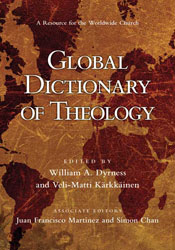 The emergent-friendly, Global Dictionary of Theology, makes a distinction between ‘Hopeful Universalism’ and ‘Convinced Universalism’:
The emergent-friendly, Global Dictionary of Theology, makes a distinction between ‘Hopeful Universalism’ and ‘Convinced Universalism’: Indeed, in the very preface of Love Wins, Bell contradicts Jesus’ teaching that few would actually be saved. Bell writes:
Indeed, in the very preface of Love Wins, Bell contradicts Jesus’ teaching that few would actually be saved. Bell writes: It is a sobering thought that Jesus went on to state in the verses immediately following His teaching on the narrow and broad roads, that false prophets would come in sheep’s clothing (Matthew 7:15-21). Such false prophets stand at the cross roads between the broad and narrow road, claiming to represent Christ, while pointing their followers toward the broad road that leads destruction, assuring them that it eventually leads to Heaven. Consider this for a minute. Isn’t this exactly what Rob Bell is doing?
It is a sobering thought that Jesus went on to state in the verses immediately following His teaching on the narrow and broad roads, that false prophets would come in sheep’s clothing (Matthew 7:15-21). Such false prophets stand at the cross roads between the broad and narrow road, claiming to represent Christ, while pointing their followers toward the broad road that leads destruction, assuring them that it eventually leads to Heaven. Consider this for a minute. Isn’t this exactly what Rob Bell is doing? Rob Bell not only redefines Hell by teaching that it will only be a temporary abode for those who want to leave later, but he redefines Hell by claiming that it is not so much about the after life, but it’s about what you make of the life here and now. In his book, Velvet Elvis, Bell had already stated this position:
Rob Bell not only redefines Hell by teaching that it will only be a temporary abode for those who want to leave later, but he redefines Hell by claiming that it is not so much about the after life, but it’s about what you make of the life here and now. In his book, Velvet Elvis, Bell had already stated this position: Rob Bell takes every possible liberty to deny reality and to either explain Hell away or get everyone into Heaven, regardless of his or her rejection of God and the Gospel. Bell not only empties Hell of God’s holy wrath, he creates an exit door from the inside out and claims that Hell is merely what we make it. He also claims that most of the imagery of future judgments in Hell were fulfilled on earth in AD 70 (p. 81).
Rob Bell takes every possible liberty to deny reality and to either explain Hell away or get everyone into Heaven, regardless of his or her rejection of God and the Gospel. Bell not only empties Hell of God’s holy wrath, he creates an exit door from the inside out and claims that Hell is merely what we make it. He also claims that most of the imagery of future judgments in Hell were fulfilled on earth in AD 70 (p. 81).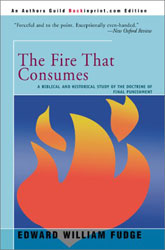 By claiming that the unrepentant wicked will have a chance to get to Heaven from Hell, Rob Bell has gone beyond that of Edward W. Fudge, who states in The Fire That Consumes,
By claiming that the unrepentant wicked will have a chance to get to Heaven from Hell, Rob Bell has gone beyond that of Edward W. Fudge, who states in The Fire That Consumes, 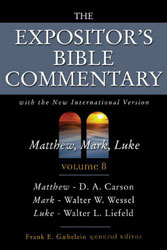 Biblical Scholar D.A. Carson, commenting on Matthew 25:46, says :
Biblical Scholar D.A. Carson, commenting on Matthew 25:46, says :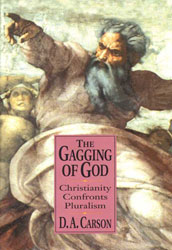 “What is hard to prove, but seems to me probable, is that one reason why the conscious punishment of hell is ongoing is because sin is ongoing.”
“What is hard to prove, but seems to me probable, is that one reason why the conscious punishment of hell is ongoing is because sin is ongoing.” There is hardly any wiggle room for a second chance in hell in these passages or anywhere in Scripture. Bell would have his readers believe of the book of Revelation that
There is hardly any wiggle room for a second chance in hell in these passages or anywhere in Scripture. Bell would have his readers believe of the book of Revelation that  May God give us the grace, in these times of apostasy, to hold fast to Jesus’ teachings and remain faithful to our loving and Holy Lord to the end. May God deliver His bride from the cotton candy Christianity that is endemic in Emergent Churches and among false prophets who lead the lost into believing they can put off repentance until after death.
May God give us the grace, in these times of apostasy, to hold fast to Jesus’ teachings and remain faithful to our loving and Holy Lord to the end. May God deliver His bride from the cotton candy Christianity that is endemic in Emergent Churches and among false prophets who lead the lost into believing they can put off repentance until after death.
Leave a Reply